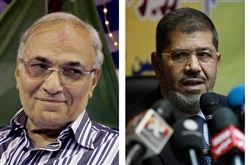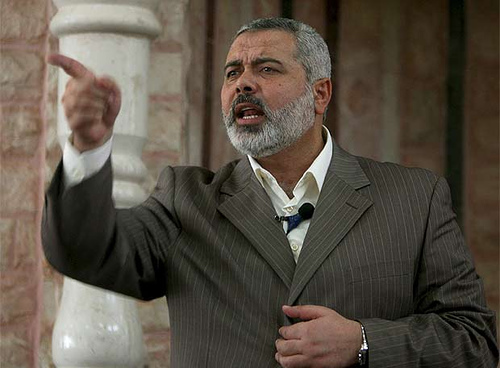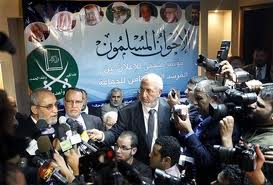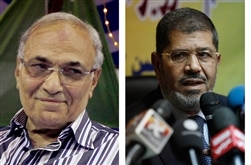Mursi and Shafiq represent very different strands of Egyptian society. Shafiq will continue to draw his support from people fearful of an Islamist takeover, and those exhausted by the upheavals of the past 16 months
 The official results of the first round of the historic Egyptian presidential elections, the first ever in Mother Egypt where the results were not known in advance, present an encouraging snapshot of “new democratic Egypt” given that close to 50% of Egypt’s approximately 50 million eligible voters, some standing in line to vote in scorching heat for hours, will not be officially announced until late May.
The official results of the first round of the historic Egyptian presidential elections, the first ever in Mother Egypt where the results were not known in advance, present an encouraging snapshot of “new democratic Egypt” given that close to 50% of Egypt’s approximately 50 million eligible voters, some standing in line to vote in scorching heat for hours, will not be officially announced until late May.
It appears, based on exit polls and information from the Muslim Brotherhood media office, that the two candidates who will face each other in the June 16-17 final round of voting will be the Muslim Brotherhood’s Mohammed Mursi (25%) facing Mubarak-era Prime Minister Ahmed Shafiq (24%).
Mr Mursi and Mr Shafiq represent very different strands of Egyptian society. Mr. Shafiq will continue to draw his support from people fearful of an Islamist takeover, and those exhausted by the upheavals of the past 16 months.
Both finalists will carry substantial political baggage into Round Two. While Mursi will have the vast and competent Muslim Brotherhood organization working during the next two weeks to get out the vote for him, as well as the support of most Islamist parties, his candidacy still faces pervasive voter doubt over having the long outlawed MB control both the Egypt’s Parliament and its Presidency. Egyptian voters appear to be worrying that this kind of broad power effectively is too similar to the Mubarak era and also eliminates checks and balances needed to moderate MB’s pledge to enact Sharia law and to honor its commitment to scrap military rule.
The following statement by the MB’s Mohammad Mursi, delivered just last week at a Cairo University campaign rally is raising concern:
“The Quran in our Constitution, the Prophet is our leader, jihad is our path, and martyrdom in the service of God is our goal. We shall enforce Islamic Sharia, and shall accept no alternative to it.”
 Israel and the US will back Mr. Shafiq in various ways and he will benefit from the view that he represents Egypt’s military, many of the countries wealthy and powerful more conservative voting blocks, the business community, Coptic Christians, ( roughly ten percent of the voters) who understandably seek security above all else, and many others who will vote for what they calculate to be the “lesser of two evils”.
Israel and the US will back Mr. Shafiq in various ways and he will benefit from the view that he represents Egypt’s military, many of the countries wealthy and powerful more conservative voting blocks, the business community, Coptic Christians, ( roughly ten percent of the voters) who understandably seek security above all else, and many others who will vote for what they calculate to be the “lesser of two evils”.
Yet barring surprises such as ex-President Hosni Mubarak being found innocent of all charges on June 2 when the verdict is to be announced in his case, which many lawyers are predicting is exactly what will happen, Mohammad Mursi will very likely prevail in the mid-June run-off and become Egypt’s first democratically elected President.
Many Middle East analysts, including American University of Beirut political sociology professor Sari Hanafi, believe this result will be good for the more than five million Palestinian refugees in the diaspora, those still under Zionist occupation in their own country, and welcomed by all who view the Palestinians full Return to their still occupied country and the dismantlement of the one remaining 19th century colonial enterprise, as a long overdue historical imperative.
 The Prime Minister of the Palestinian government in Gaza, Ismail Haniyeh, declared on Thursday that “The Egyptian presidential election results will have a very positive affect on the course and future of the Palestinian cause as well as the role and place of the Muslim people in the world.”
The Prime Minister of the Palestinian government in Gaza, Ismail Haniyeh, declared on Thursday that “The Egyptian presidential election results will have a very positive affect on the course and future of the Palestinian cause as well as the role and place of the Muslim people in the world.”
Haniyeh knows that the Muslim Brotherhood, from which Hamas evolved, is highly sophisticated politically and while it tries to avoid attracting condemnation, or worse, from Washington and Tel Aviv, the MB intentions regarding Camp David, giveaway gas and other deals with Israel, and even diplomatic relations with the occupiers of Palestine are clear. A majority of Egyptians believe all will eventually be discarded as will the remaining 19th century colonial enterprise itself.
Hamas officials have also acknowledged that they are looking more to Egypt and the Brotherhood for support as they move away from Syria and a top Hamas official, Mousa Mohammed Abu Marzook, settled in Cairo after fleeing the unrest in Syria and maintains close ties with the Brotherhood.
Mursi has a long history of criticism of Israel’s treatment of the Palestinians. He has referred to Israel’s Foreign Minister Lieberman as a “vampire” and the settler movement as “Draculas.” Mr. Mursi has also criticized the Fatah leader Mahmoud Abbas for what he called gullible collaboration with Israel for believing they would voluntarily accept a Palestinian state, and he has praised Hamas for resisting the Israeli occupation.
 Brotherhood leaders have said they intend to use their influence with both Fatah and Hamas to urge them to compromise with each other to press Israel to recognize a Palestinian state. “The Brotherhood will gently pressure Hamas to be more pragmatic, although that is a direction that Hamas is already moving,” according to Shadi Hamid of the Brookings Doha Center.
Brotherhood leaders have said they intend to use their influence with both Fatah and Hamas to urge them to compromise with each other to press Israel to recognize a Palestinian state. “The Brotherhood will gently pressure Hamas to be more pragmatic, although that is a direction that Hamas is already moving,” according to Shadi Hamid of the Brookings Doha Center.
Speaking with MB representatives in Cairo and Beirut over the past several months, the party’s position expressed to this observer is that the common thread that stitches together all the continuing regional uprisings can be described as a fundamental quest for dignity and the casting off of humiliation either from western imposed despotic regimes or from their illegitimate and aggressive agent, Israel.
Even before the completion of Egypt’s first democratic elections, which long-time election monitor Jimmy Carter has just labeled “very encouraging”, there is broad recognition in Egypt that basic dignity demands the return of Palestine and its holy places, not just to the 1.5 billion Muslims and nearly as many Christians worldwide, but to all people of good will.
While no official MB decisions have been published regarding relations with Gaza and occupied Palestine, signs are everywhere from non-enforcement of Mubarak-Israeli-American pressures on Rafah, Gaza, travel and trade prohibitions that full normalization of relations between Egyptians and Palestinians under occupation is imminent.
And Israel and its American lobby know it and are preparing.
On Capitol Hill, and among the more than 60 intensively active and well-funded pro-Zionist organizations in the US, a campaign has already begun to neuter the Egyptian voter’s choice next month as surely as was achieved during the three decades of Mubarak rule.
A couple of examples.
AIPAC has launched a campaign to have the Obama administration, during the run-up to the coming election, now barely six months away, demand three things from the Mursi government:
- that the Mother Brotherhood scrap key elements of its political program and disassociate itself for “Islamism”,
- that it publicly pledge to fight “terrorism” i.e. the Palestinian and Lebanese resistance, and
- that the MB pledge in writing to fully abide by the Camp David accords.

Washington, according to Israel must insist that Egypt not only maintain its peace treaty with Israel, but Obama must tell the Brotherhood that any referendum on the Camp David Accords will be interpreted by the US as an attempt to destroy that agreement.
According to Israeli government promoter Dennis Ross, “In recent conversations, Brotherhood leaders have expressed their belief that they would not be blamed if the treaty were revoked by a nationwide vote, as seems likely. They need to be told otherwise.”
When measured against what the MB stands and has struggled for since its founding in 1928 by the Islamic scholar and schoolteacher Hassan al-Banna as well as the growing demands of the Egyptian public coupled with regional pleas for Egypt's new government and to restore Arab and Muslim dignity, these Israeli-US demands are patently absurd.
 Ever in the service of Israel, Elliot Abrams, writing in the Zionist Islamophobic Weekly Standard, is proposing an approach that appears as fanciful and misguided as his WMD 2002-3 schemes to get the US to attack Iraq on behalf of Israel or his continuing five year campaign to get the US to bomb Iran for Israel.
Ever in the service of Israel, Elliot Abrams, writing in the Zionist Islamophobic Weekly Standard, is proposing an approach that appears as fanciful and misguided as his WMD 2002-3 schemes to get the US to attack Iraq on behalf of Israel or his continuing five year campaign to get the US to bomb Iran for Israel.
Abrams is arguing recently, apparently seriously, that since the MB will be Egypt’s new government, Israel can still prevail if his advice is followed. Obviously unhappy with the prospect of the Muslim Brotherhood governing Egypt, Abrams does what he is paid to do for Israel, i.e. he metaphorically paints Pigs hoping they will look like Princesses.
Eliot is publicly blaming the US for not "standing by the Mubarak regime like the Russians are with Syria’s." He declared “Had Mubarak and the Army played their cards better; Shafiq might have been Mubarak's successor without the harmful uprising that Egypt has experienced. Egypt’s peace treaty with Israel with all its blessings would be secure. Now, unless Shafiq wins, Camp David is finished but we (Israel?) still have some excellent options.”
Abrams and elements of the Zionist lobby are telling Congress that “Israel must support Egypt’s "liberals" meaning, people who believe in democracy, liberty, and the rule of law rather than Islam as the guiding principles of Egypt and that the predicate must be that the electorate believes the MB had a clear chance and failed them.” He continued,“ If Shafiq were to win many Egyptians will believe the elections were stolen by the Army and the old regime's machine, and in any event power will be divided between the MB on one side and the Army and president on the other. There will be no clear lesson to learn when conditions in the country then continue to deteriorate given that the previous annual 6.5 billion foreign infusion into Egypt’s economy has reversed to a current annual $500,00 outflow with foreign investors fleeing and tourism in down 40% from when Mubarak was in charge."
Interestingly, Abrams and other spokesmen for AIPAC and the Zionist lobby are arguing that Mubarak’s most recent Prime Minister, Ahmed Shafiq’s victory next month is not necessarily something Israel and the West should favor or work to arrange. Given that the MB is the leading party in parliament and with the Salafists having an Islamist majority there, Abrams claims that this is actually good for Israel since its lobby will organize Congress to push the idea that MB control of both parliament and the presidency is dangerous and, “we can hold them and all Islamists in Egypt absolutely responsible for what happens to Egypt with its myriad problems and thus 100 percent of the responsibility for Egypt's fate will drop on the MB.”
Abrams continues, “If the MB’s Mursi wins and he will, the MB will be in charge--and be forced to deliver. And when they fail, as they will give Israel’s key friends in the international business community, it will be absolutely clear who was to blame and this is good for Israel. What is in Israel’s interest is to support Egypt’s military which it has worked closely with for years and encourage the army to fight with all its tools for its interests”.
Abrams summarizes his thesis in an AIPAC email to donors: “So as far as Israel is concerned, a Mursi victory should not be mourned; given the situation in Egypt, in this election we can assure that the loser will pity the winner. Two cheers for Mursi! Now let’s get to work.”
 |
Franklin Lamb volunteers with the Sabra-Shatila Foundation and the Palestine Civil Rights Campaign. He is reachable c/o fplamb@gmail.com He is the author of The Price We Pay: A Quarter-Century of Israel’s Use of American Weapons Against Civilians in Lebanon. |
